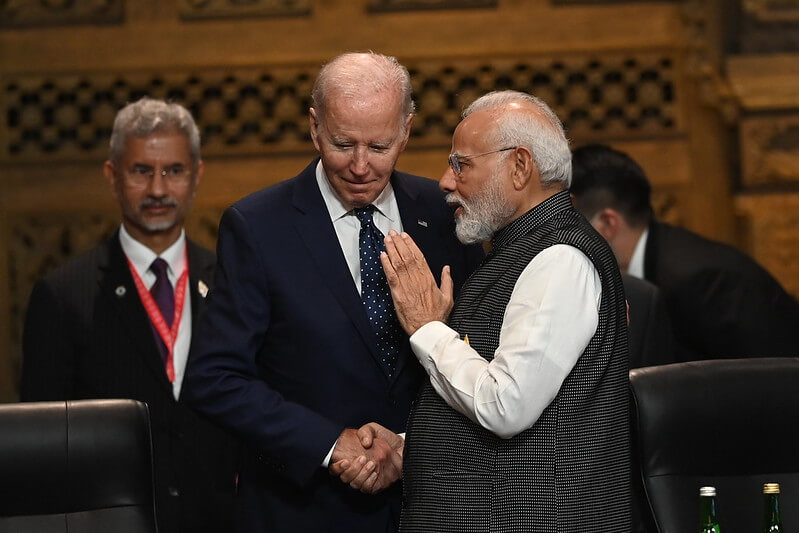US authorities thwarted a plot to kill a Sikh separatist on American soil and issued a warning to the Indian government on suspicions that New Delhi was involved in the plan, the Financial Times (FT) reported, citing sources.
The report comes two months after Canada indicated there were “credible” suspicions linking Indian agents to the June assassination of a Sikh separatist leader, Hardeep Nijjar, in a Vancouver suburb. India has denied Canada’s allegations.
US Thwarts Sikh Assassination Plot
The FT report reveals that the plan’s target was Gurpatwant Singh Pannun, an American and Canadian citizen who works as general counsel for Sikhs for Justice (SFJ), a US-based organisation that is part of a movement pushing for an independent Sikh state named “Khalistan.”
Sources familiar with the issue informed FT that the initial US objection about the Pannun plan was issued during Indian PM Narendra Modi’s high-profile state visit to Washington in June. US federal prosecutors have filed a confidential indictment against at least one alleged perpetrator of the plot in a New York district court, separate from the diplomatic warning.
The US had foiled a plot to assassinate a Khalistan supporter on American soil and issued a warning to India over concerns that the Modi government was involved in the conspiracy, the Financial Times reported. https://t.co/b5NtJ6KQBX
— Scroll.in (@scroll_in) November 23, 2023
The Indian foreign ministry is yet to comment…
Furthermore, FT also reported that one of the people charged in the indictment has been reported to have fled the country, further complicating the case. Sources familiar with the issue did not divulge whether the protest to New Delhi prompted the plotters to abandon their plan or whether the FBI interfered and stopped an already-in-progress conspiracy.
Meanwhile, India’s Ministry of External Affairs said in a statement that "the US side shared some inputs pertaining to [the] nexus between organised criminals, gun runners, terrorists, and others” during recent discussions on India-US security cooperation. “The inputs are a cause of concern for both countries and they decided to take necessary follow-up action,” the ministry explained, adding that the concerns were “already being examined by relevant departments.”
White House Remarks
Before the release of the report, the National Security Council (NSC) told the FT that the US “did not comment on ongoing law enforcement matters or private diplomatic discussions with our partners.” It did, however, emphasise that “upholding the safety and security of US citizens is paramount.”
“We are treating this issue with utmost seriousness, and it has been raised by the US government with the Indian government, including at the senior-most levels,” NSC spokesperson Adrienne Watson stated. Watson also noted that when it mentioned the issue, Indian officials expressed “surprise and concern,” and that “activity of this nature was not their policy.”
“We understand the Indian government is further investigating this issue and will have more to say about it in the coming days,” Watson said. “We have conveyed our expectation that anyone deemed responsible should be held accountable.”
NIA Registers Case Against ‘Listed Terrorist’ Pannun over Video Threat to Passengers Flying Air India pic.twitter.com/FjEBTCV0Bj
— NIA India (@NIA_India) November 20, 2023
Who is Gurpatwant Singh Pannun?
Pannun, who holds dual citizenship in Canada and the US, is a pro-Khalistan lawyer who was a prominent organiser of nonbinding referendums seeking a separate Sikh state, which were organised in nations with big Indian diasporas like Canada, the UK, and Australia.
The SFJ was banned by the Indian government in 2019 under the Unlawful Activities (Prevention) Act for its anti-India actions. Pannun was designated an “individual terrorist” under the UAPA a year later for promoting secessionism and for urging Punjabi Sikh youngsters to take up arms.
Earlier this month, the separatist leader made headlines again after threatening an international blockade and demanded that Air India would not be allowed to operate. He also stated that the Indira Gandhi International Airport in Delhi would be renamed and closed on 19 November.
“We are asking the Sikh people not to fly via Air India. From 19 November, there will be a global blockade. Air India won't be allowed to operate. Sikh people don't travel by Air India after 19 November. Your life can be in danger,” Pannun said in a video.
This week, the National Investigation Agency filed a case against the ‘listed individual terrorist’ under various sections of the Indian Penal Code (IPC) and the UAPA in response to his threats.
When contacted by the FT, Pannun refused to clarify whether US authorities had informed him about the plan, stating that he would “let the US government respond to the issue of threats to my life on American soil from Indian operatives.” “The threat to an American citizen on American soil is a challenge to America’s sovereignty, and I trust that the Biden administration is more than capable to handle any such challenge,” Pannun remarked.
Pannun mentioned that Nijjar had been his “close associate” for over 20 years and was like a “younger brother” to him. He blamed India for the death of the latter.
Nijjar Killing, Canada’s Allegations on India
On 18 June, Nijjar was shot outside a Sikh Gurdwara in Surrey, a Vancouver suburb with a significant Sikh community.
In July 2020, the Indian government designated him as a “terrorist” for his separatist actions and issued him an Interpol red corner notice.
Canadian PM Justin Trudeau accused India of being behind Nijjar’s death, calling the June incident an “unacceptable violation.” India slammed Trudeau’s allegations, calling them “absurd and motivated.”
Canada stated it was “actively pursuing credible allegations” of foreign government agents’ involvement in the death, calling it an “unacceptable violation” of its sovereignty.
Reportedly, these allegations have been detrimental to relations between India and Canada, which have been strained by the Khalistani movement.

